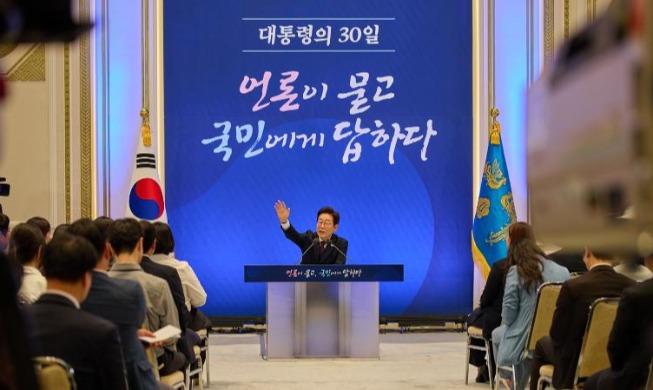By Kim Hayeon and Kim Yeonsue
Video = Kim Sunjoo
"It very much tells a story of my family, your family, of all of our families, not just Korean families, but so many families around the world. And it really felt important."
Soo Hugh, the so-called showrunner of the original Apple TV+ series "Pachinko" who was the scriptwriter and executive producer, had this to say on why she chose Lee Min Jin's acclaimed novel to make into a series: "I wanted to bring it to life because I think it's a very important and beautiful story."
Korea.net on April 15 held an exclusive video interview with Hugh, who was in Washington.
The Korean American was born in Busan and immigrated to the U.S. at age 1. "I am Solomon very much and that's the story I had to tell," she said.
She is in charge of planning, screenwriting and general production of the drama, which was based on the novel released in 2017.
"When you're in America and growing up in a very white neighborhood, I'm not one of them. But when I go to Korea, I'm not one of them," Hugh said, "My experience, which mimics so many immigrants' experiences, is that I'm split in half always."
"And that splitting has made me stronger at times, but it sometimes made me very much crave community."
"I think what we're finding is this really strong generation of Korean Americans are learning how to express that experience," she added. "But when making this show 'Pachinko,' I feel more Korean than ever, And that was something that I was very proud of."
On the drama's production, Hugh said, "So much of my struggle was understanding, what my parents went through and then thinking about my halmeoni (grandma), what she must've gone through," adding, "In making this show, I feel I became closer with my family."
While trying to stay faithful to the novel, she said she put a lot of effort into giving the impression that each generation communicates with one another, and wanted the series to be as real as possible and not give viewers a feeling of old as if reading a history book.
"Everything has to feel like you can touch it: the Hanboks and the food on the table," she said, "When you look at the food, I wanted people to smell it, almost as if you can feel the food and the sounds."
"I think, most importantly, (I wanted) to give Korean people dignity."
Many efforts went into making this possible. The script used three languages -- Korean, Japanese and English -- and even within them, Hugh had to distinguish the dialects.
"Some actors knew English, some actors didn’t know English," she said smiling. "There were more translators on set than sometimes more actors."
She also strived to feature Korean traditions like Hanbok and kimchi to display the background of each generation.
Hanbok designer Chae Kyung-hwa and her team placed delicate attention to reproducing outfits that people in each generation wore.
The New York Times article "One Garment's Journey Through History" on April 9 said, "The evolution of the Korean hanbok is a lens into the history of the country, which is now being traced in the series 'Pachinko.'"
On the process of Hanbok production mentioned by the article, Hugh said, "Kyung-hwa and her team spent so much time making the fabric feel and look old," adding, "When you think about Sunja and Yangjin and that generation, they didn't have lots of clothes. They only had a few Hanboks. They washed them all the time and then dried them in the sun."
"So Kyung-hwa and her team would dry the Hanboks in the sun to make sure they really got that feel and to make sure the material was really authentic."
On the global boom of Hallyu, the executive producer said, "I'm so proud."
"Korean culture has been thousands of years. 'Squid Game' is not made for America. And now finally the rest of the world is realizing just how amazing Korea's culture is," she added. "And I hope it just gets bigger and bigger."
"Pachinko" has won global acclaim for depicting four generations of a Korean Japanese family from the Japanese occupation period to the late 1980s.
The BBC of the U.K. called the drama "a dazzling, heartfelt Korean epic" and gave it a perfect review score. The Times said, "Around the world, millions more may soon find themselves addicted to a soapy, bittersweet television series called 'Pachinko.'"
hayeounk8@korea.kr
